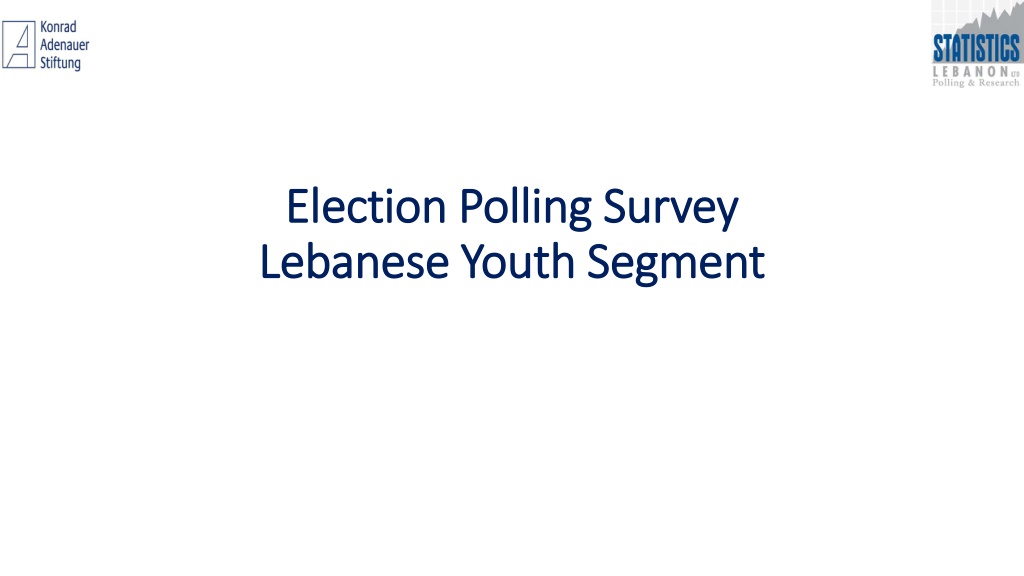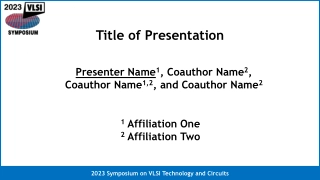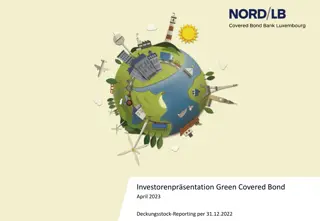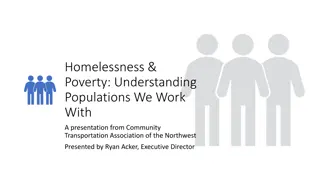Analysis of Lebanese Youth Participation in Elections Survey
The survey conducted by Statistics Lebanon Ltd. provides insights into Lebanese youth participation in elections. The methodology, sample size, demographics, and district-wise distribution are detailed. Findings indicate that 51% of youths voted in the 2016 municipal elections, with 66% of non-voters not listed on the voter lists. Explore more about occupation, education levels, gender distribution, marital status, and geographical representation of respondents.
Download Presentation

Please find below an Image/Link to download the presentation.
The content on the website is provided AS IS for your information and personal use only. It may not be sold, licensed, or shared on other websites without obtaining consent from the author. Download presentation by click this link. If you encounter any issues during the download, it is possible that the publisher has removed the file from their server.
E N D
Presentation Transcript
E Election Polling Survey lection Polling Survey Lebanese Youth Segment Lebanese Youth Segment
Methodology Methodology This survey was conducted by Statistics Lebanon Ltd between 15.03.2018 and 02.04.2018. The sample size for this survey was n=1,200. Lebanese males and females (50/50) aged between 21 and 29 years old. The sample was drawn using the Probability Proportional to Size (PPS) sampling technique. It covered all Lebanese governorates and socio-economic groups. Interviews were conducted face-to-face. Statistical data analysis was accomplished using SPSS 22. The survey's margin of error is 2.83%.
Demographics Demographics
Occupation Level of education Gender Free lancer Male 50% 37% University degree 47% Student Female 50% 24% High school education 20% house wife 11% Supplementary Education Age 15% Employee B 8% 21-23 years 33% Vocational training 11% Unemployed 24-26 years 29% 8% Primary education 27-29 years 38% 4% Employee C 7% Graduate certificate Employee A 3% 5% Marital Status Single 64% Monthly income of the family Religion Married 28% Christian 1001$ 2000$ 39% Engaged 38% 8% Sunni 2001$ -3500$ 27% 25% Number of children Respondents with family (n=330) 0-2 children Shiaa 501$ - 1000$ 23% 26% Less than 500$ More than 3501$ 9% 5% Druze 8% 75% 3-6 children 25% 4
District Governorate Baabda El Meten BEIRUT AKKAR Tripoli Baalbek Chouf Sour Aley Kesrwane Saida Villages Zahle El Minieh-Dennie El Nabatieh Jbeil West Bekaa Bent Jbeil El Koura Saida Zgharta 13% 12% 10% 7% 7% 5% 5% 5% 4% 4% 3% 3% 3% 3% 3% 3% 2% 2% 2% 2% MOUNT LEBANON 33% NORTH 14% SOUTH 11% BEIRUT 10% AKKAR BEKAA 7% 7% Kesrwan-Jbeil 7% BAALBEK-EL HERMEL 6% El Nabatieh 6%
Section 1: Section 1: Youth Participation in Elections Youth Participation in Elections
Did you vote in the 2016 municipal elections? Yes 51% No 49%
If you answered "No", was your name listed on the voter lists? (n= 590) No 66% Yes 25% Don't know 9%
Have you confirmed that your name is on the voter lists of 2018? Yes 75% No 25%
Has the new parliamentary electoral law become clear to you with respect to:/How to vote? Yes 77% No 23%
Has the new parliamentary electoral law become clear to you with respect to:/How votes are sorted/counted? Yes 57% No 43%
In your opinion, will the new parliamentary electoral law improve representation? Yes 56% No 29% Don t know 16%
Will you participate in the parliamentary elections scheduled for May? Yes 76% No 16% Don t know 8%
Why do you want to vote? n=908 National right and duty 35% To express my opinion 19% To support a particular candidate 10% To improve the situation 7% To support a specific party 7% Other reasons 7% To deliver the vote 7% To participate in decision making 4% To give an opportunity to the youth 2%
Why wont you vote? n=195 I don't trust anyone 33% I don't care 18% The election is useless 16% The results are known 9% No answer 4% Don't know 4% Personal reasons 3% No one represents me 2% No reason 2% The polling place is far away 2% Not understanding the Law 2% I don't like the Law 2%
Why dont you know? n=97 I didn't decide yet 28% Don't know 18% The election is useless 14% No reason 7% I don't care 7% I don't trust anyone 7% The results are known 5% Family Decision 3% No answer 3% Outside Lebanon 2%
Analysis: Youth Analysis: Youth Participation in Elections Participation in Elections Voting in Municipal elections 2016: Up to 51% of the youth had already previously participated in the municipal elections Only 25% chose not to vote although they were registered in the lists Intention to Vote in Parliamentary elections A majority of 76% of youth intend to vote in the forthcoming elections Just 8% said they did not know if they would vote and 16% indicated they would not Up to 75% of those who intend to vote have checked that they are registered in the electoral rolls Comprehension of new law How to Vote is clear to 77% of this age group How the votes are counted/sorted is still unclear to 43% of the respondents Representation under new law According to a majority (56%) representation has been improved by the new law However nearly a near third (29%) do not agree
Analysis: Motivation to Participate Analysis: Motivation to Participate Reasons for Voting Volunteered reasons for voting underline proactive attitude to youth to participation 35% believe it is a National right & duty to vote 19% are driven by the Right to express an opinion 7% believe that they should make themselves heard and Deliver their vote As many (7%) believe they are voting to Improve the situation The other reason that drives participation is loyalty to parties or candidates 10% want to support a Particular candidate and 7% vote out of loyalty to Support a specific party Just 2% stated they are voting to support youthful candidates Reasons for not voting The main reason is lack of trust for 33% Followed by a sense of futility 16% believe the Election is useless 9% that the Results are predetermined It can be noted that only 2% are not voting because they do not understand the new law Don t know: 28% are still undecided
For those who have declared that they will participate in the parliamentary elections (n=908), have you chosen the list or candidate you will vote for? Yes 83% No 17%
For those who have announced that they will participate in the parliamentary elections, which list will you choose?(n=908) Political party list 66% List of particular candidate (party or non-partisan) 26% Civil society list 6% No one 2%
If the party that you choose to vote forms a coalition with one of the parties that you will not vote for, what will you do? (n=908) I will vote for the list in any case, and I will give the voice of preference to the party I support 88% I will vote with a white paper 7% I will vote for another list 4%
For all, is it possible to give your vote of preference to a candidate from another sect? Yes 55% No 45%
Analysis: Voting Choice Analysis: Voting Choice Electoral choice The vast majority have already chosen mainly based on loyalty to parties or candidates 83% stated they have decided on their choice ahead of the election Of those 66% stated they will vote for political parties Followed by 26% for the list containing a specific candidate Just 6% said they plan to vote for civil society lists Impact of list coalitions on voting 88% will vote for their party even if the electoral list include other parties they object to/would not vote for Just 4% would switch their vote in that eventuality Voting for candidate from another sect 55% would give versus 45% would not give, the Preferential vote to a candidate from another sect
To what extent do the following have any influence on your electoral choices? 41% 28% 15% 6% 10% Personalities who offer services 40% 26% 13% 8% 13% Political Parties 39% 29% 13% 7% 12% Political figures 36% 24% 14% 10% 17% Family 23% 24% 22% 11% 20% Social media 23% 24% 20% 13% 19% Media 18% 22% 18% 14% 28% Friends 15% 16% 21% 19% 30% The party I oppose To a very great extent To a great extent To a moderate extent To some extent Not at all
Who has the most influence on your electoral choices? (One answer only) The political party I support 25% Person providing services 21% Family 20% The political personality I support 16% No one 14%
To what extent do the following affect your electoral choices? 58% 26% 8% 3% 5% The candidate's achievements 55% 26% 11% 3% 5% The services provided by the candidate for my area 53% 26% 12% 3% 6% Supporting candidates from the youth category 53% 25% 10% 5% 8% The electoral program 48% 26% 14% 5% 7% Support woman candidates 46% 29% 13% 4% 8% The services provided by the candidate to my family 43% 22% 11% 6% 18% Political affiliation of the candidate 38% 21% 15% 10% 16% Financial assistance provided by the candidate 32% 22% 20% 10% 16% The sectarian affiliation of the candidate 32% 26% 18% 10% 14% The party leader of the candidate 30% 23% 22% 8% 17% Domestic Family Resolution 25% 23% 24% 11% 18% Friendship of the candidate with the party leader To a very great extent To a great extent To a moderate extent To some extent Not at all
What is the main reason that affects your electoral choices? (One answer only) The candidate's achievements 34% Political affiliation of the candidate 18% The services provided by the candidate for my area 17% The electoral program 13% No answer 5% Supporting candidates from the youth category 4% The family decision 3% The services provided by the candidate to my family 2% Don't know 2% Support women candidate 2% Other reasons 2%
To what extent do you support women's participation in these elections? 49% 23% 13% 4% 10% To a very great extent To a great extent To a moderate extent To some extent Not at all
To what extent do you agree with each of the following statements: It is the duty of every person to participate in the voting process to communicate their opinion 60% 23% 10% 3% 4% Participation in the voting process is a contribution to decision-making 49% 25% 14% 5% 7% Participation in the voting process is a type of accountability 41% 28% 14% 6% 11% Participation in the voting process will not be affected because the results are known in advance 28% 21% 20% 13% 18% Take into account family interests in parties 27% 27% 26% 6% 14% Take into account family interests in power 25% 27% 26% 8% 15% 25% 20% 19% 17% 20% Elections do not change anything Strongly agree Agree Neutral Disagree Strongly Disagree
How do you influence politics as a citizen? Election 58% Do not affect 24% Affiliation to political parties 9% Participation in protests and demonstrations 4% Membership in non- governmental organizations 3% Media follow-up 3%
What are your expectations regarding the results of the parliamentary elections? The political situation remains the same 47% Change in political balances 44% I do not expect anything 9%
Analysis: Influencers on Voting Choices Analysis: Influencers on Voting Choices The top influences on electoral choices Services offered which 69% (Influential/ Very influential) Political party (66%) or Personality (68%) Family (60%) Media/Social media play on important role according to 47% Single most compelling influence Political party is the most compelling influence for 25% Just slightly ahead of Person Providing services for 21% Extent factors influence choice mainly related to achievement & services Achievements of candidate influential/very influential for 84% Services to the community were influential/very influential for 81% Services to family influential/very influential 75% Financial assistance provided by candidates influential/very influential for 59%
Analysis: Influencers on Voting Choices Analysis: Influencers on Voting Choices Promoting youth and women relevant 79% stated support young candidates 74% support women candidates with 49% supporting to a very great extent Level of agreement with benefits of participation high 83% believed it is The duty of every person to communicate their opinion 74% believed that It is a Contribution to decision-making 69% believed that it is a Type of accountability Level of agreement with potential avenue for change 58% believe the main way that citizens can influence politics is through elections 44% who believe that elections will result in change in the current balance But 45% strongly/agreed that it Do not change anything versus 19% neutral and 37% disagreeing
Section 2: Section 2: Political Orientation Political Orientation
Who is your ideal public figure? (it is not necessary to be a political figure) No One 27% Others 27% Hassan Nasrallah 12% Nabih Berri 11% Saad el Hariri 7% My Father 5% President michel aoun 4% Dr Samir Geagea 3% Walid Jounblat 3% My Mother 3%
Who are the 3 Lebanese political figures who express your opinion No one 24% Hassan Nasrallah 22% Nabih Berri 16% Saad El Hariri 11% General Michel Aoun 11% Samir Geagea 9% Ziad Baroud 4% Sleimen Franjieh 4% Elias Bou saab 4% Sami Gemayel 3% Walid joumblat 3% Setrida Geagea 3% Ali Hassan Khalil 3% Achraf Rifi 3% Chamel Roukoz 2% Wael Abou Faour 2% Salem zahran 2% Wiam Wahab 2% Gebran Bassil 2% Walid jounblat 2% Najib Mikati 2%
Which is the political party that expresses your opinion? No One 27% Hizboullah 12% Amal Mouvement 11% Lebanese forces 10% Future Mouvement 10% Free Patriotic Movement 9% Progressive Socialist Party 7% Civil Society 7% Others 6% Kataeb Party 2%
Are you a member of any political party? No 91% Yes 9%
If yes, what is this party? (n=109) Hizboullah 25% Amal Mouvement 18% Lebanese forces 17% Free Patriotic Movement 17% Kataeb Party 7% Al Azem Wal Saada 6% Others 5% Syrian Social Nationalist Party 3% Lebanese Democrati 2% Marada Movement 2%
If yes, what makes you support to this party in the first place?(n=109) I love the party leader 28% My family supports this party 27% The ideas of this party convince me 25% This party maintains the existence of the sect 14% It is better than other parties 6%
Do you aspire to participate in public affairs? No 89% Yes 11%
If yes, at what level? n=132 Parliament 52% Municipality 48%
Which of these countries support Lebanon? Saudi arabia 30% Iran 22% No One 16% France 9% European Union 7% Russia 7% United states 5% Don't Know 4%
Analysis: Political Orientation Analysis: Political Orientation Ideal public figure Lebanese youth seemed to have diverse opinions regarding whom they consider as their ideal public figure. In addition to that 27% of the respondents do not have any ideal public figure. The top 3 political figures who express the Lebanese youth opinions are: Hassan Nasrallah (22%) Nabih Berri (16%) Saad el Hariri (11%) However a considerable number of respondents (24%) believed that none of the political figures express their opinions. The top 3 political parties which express the Lebanese youth opinions are: Hizbouallah (12%) Amal movement (11%) Lebanese forces (10%) However 27% stated that none of the political parties express their opinion
Analysis: Political Orientation Analysis: Political Orientation Political membership The vast majority of the respondents (91%) are not members of any political party. The minority of the respondents (9%) are members either because they (28%) or their family (27%) support the party leader or because the idea of the party convince them (25%). Participation in public affairs Majority of the Lebanese youth (89%) do not aspire to participate in public affairs The minority (11%) who want to participate in the public affairs are equally interested in either parliament (52%) or municipality (48%). Main countries that support Lebanon The First most supporting country according to the Lebanese youth is Saudi Arabia (30%) followed by Iran (22%).
Section 3: Section 3: Sources of Information Sources of Information
What sources do you use for information and political news? TV 79% Social media 30% Websites 24% Radio 8% From trusted people 7% News service/notifications 4% Newspaper 1% I do not follow the news 1%
To what extent do you trust these sources? Partial trust 48% A lot of trust 27% Little trust 10% Great deal of trust 10% No trust at all 6%
Name your primary source: New tv 25% MTV 24% LBC 23% Other sources 11% NBN 7% OTV 4% Future 4% Al Manar 3%
Name your secondary source: LBC 15% MTV 14% New tv 12% NBN 4% Nothing 4% Al manar 3% Future 3% OTV 2% Mtv.com.lb 2% Lebaneseforc es.com 2% Tayyar.org 2% Lebanonfiles. com 2% Aljadeedonli ne 2%























